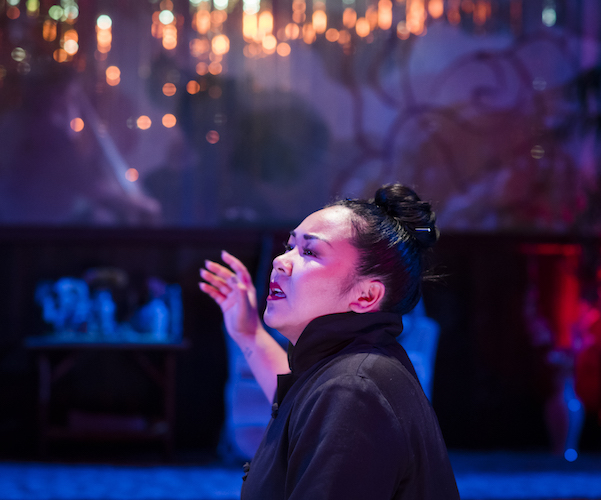Theater Review: “Dragon Lady” — One Badass Matriarch
By Michael Lin. Addendum by David Cruz.
Dragon Lady’s power lies partly in its existential authenticity, the power of the personal.
Dragon Cycle, created and performed by Sara Porkalob. Directed by Andrew Russell. Two works staged in repertory by the American Repertory Theater at Oberon, 2 Arrow Street, Cambridge, MA, through April 7.

Sara Porkalob in “Dragon Lady.: Photo: Robert Wade/Courtesy of Intiman Theatre (Seattle, Washington)
Note: The one-woman musical show Dragon Lady is the first of Sara Porkalob‘s Dragon Cycle trilogy. This review is the first of a two-part collaboration between critics Michael Lin and David Cruz, who will review both installments.
Dragon Lady opens with a mashup of “House of the Rising Sun” and Coolio’s “Gangsta’s Paradise,” performed by playwright Sara Porkalob in the guise of her grandmother, Maria Porkalob, Sr.. As Maria briefly has fun with the karaoke machine that will be a part of her upcoming birthday party, we learn something about her character. She is boisterous and silly, vibrantly alive when she’s singing. In the opening scenes Porkalob strolls through the audience, cabaret-style, building good will immediately. This image of vitality is something that we can return to (a sort of mental bookmark) as we witness the dramatic and troubling turns of Maria’s life, from her childhood in the Philippines up to her and her children’s struggles in America.
These trials and tribulations are treated with perceptive humor, light and dark, in Dragon Lady. In an early vignette, Maria Sr. hands her five-year-old daughter a golf club, points her in the direction of a bully in the trailer park and instructs the child to “kill her.” Violence is internal as well as external; Porkalob fearlessly tackles deep and difficult conflicts in the family. But the playwright looks at her grandmother with a refreshing clarity — she avoids judgment as we see the far-reaching impact the matriarch’s decisions had on the future of their family.
The bulk of the show focuses on two time periods: Maria’s youth in the Philippines as a singer and single mother who escapes to servitude; and her new life in the United States with her five young children as they struggle with poverty, food insecurity, and racial discrimination. The latter challenge is tangential to the story, though fellow members of the Asian diaspora will undoubtedly recognize how Orientalism haunts Maria’s life whenever a white man steps into it. Porkalob focuses on her grandmother’s sacrifices ,while noting how her children are too hungry and lonely to recognize them.
Sara Porkalob performs almost dozen figures masterfully and precisely, covering an impressive age range. Each character is distinct and compelling, invigorated through little more than imagined props, physical mannerisms, and an ensemble’s worth of vocal affectations. The performer’s singing voice is rich, expressive, and perfectly suited for the jazzy soundtrack, performed live by a three-piece subset of Cascadia-based band Hot Damn Scandal. Outside of the group’s original compositions, the song selections range from the evocative, the red-light-tinged “Sway” as Maria falls for a dangerous gangster, to the exaggerated James Bond action theme as she storms his hideout to rescue her kidnapped baby daughter, allegedly throwing punches and ninja stars in the process (“Out of the way, bitches! It’s Grandma”).
Dragon Lady power lies partly in its existential authenticity, the power of the personal. Only Porkalob could tell it properly: the expansions of a theater company would be distractions. The story of her grandmother reminds us of the ways we ahve received stories from our own family members — yarns that meander from one time frame to another, full of unlikely embellishments that are blasphemous to question, if only because they generate the mystery that keeps the family gathered around, listening intently, nodding their heads, winking an eye. The title Dragon Lady sounds ferocious, but the evening’s theme is “family.” This is underlined at the very end of the show, when the audience is invited to sing “Happy Birthday” as if to our own grandmother.
Dragon Lady is a memorable theatrical experience that dramatizes the resilience of its real-life subject, Maria Porkalob Sr., inviting (or daring?) us to embrace her as our own badass matriarch. Did Maria’s life really happen as her granddaughter says did? Perhaps not. But you’d be a pretty ungrateful family member if you dared cast doubt on your dear old granny
Addendum:
While Maria’s struggles don’t emphasize racial tension, Porkalob’s narrative is distinctly Filipinx. Tagalog is peppered into the dialogue. Servants utter “yes, ma’ams” with proper inflection and mannerisms that accompany the interaction of class hierarchies.The contours of Maria’s life echo the broader trends of Filipinx-American immigration (e.g., romantic relationships with white US servicemen, life in Washington and Hawaii).
Along with these productions, there will other opportunities to learn more about Filipinx culture: Porkalob is giving a talk at Harvard University and she will be hosting an activist writing workshop at the beginning of April. Also, Lav Diaz, a noted Filipino filmmaker, is presenting three of his films at the Harvard Film Archive. As for Porkalob’s celebration of Filipinx identity, that continues with Dragon Mama, the second play in her trilogy, which receives its world premiere at the Oberon on March 28.
— David Cruz
Michael Lin is a science copyeditor and former game designer based in Boston, as well as an actor and playwright. His theatrical writing has most recently been performed by Theatre@First, the Post-Meridian Radio Players, and Staten Island-based Sundog Theatre. A graduate of the MIT Comparative Media Studies program and member of the Asian American Playwright Collective, Michael is excited to be contributing to The Arts Fuse.
Tagged: David Cruz, Dragon Cycle, Dragon Lady, Dragon Mama, Michael Lin
